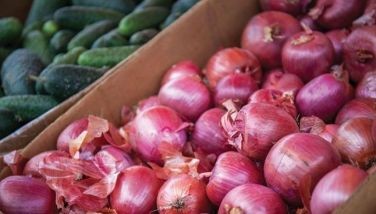Ethanol ‘flex cars’ can be good start

January 25, 2006 | 12:00am
The bad news is out… oil prices are once again on the rise. The brewing crisis in Iran and the security problem in the Nigerian oil fields are contributing to the upward movement in prices. As expected, the local oil companies are quick to reflect the trend, even in the face of a strong peso exchange rate.
If we were Brazilians, we wouldn’t care less. For one thing, Brazil’s about 90-percent petroleum self reliant, with new oil fields going into production. For another thing, they did not totally abandon the fuel alcohol program they launched during the first energy crisis years of the 70s.
The Brazilians even recently strengthened the program further by granting tax incentives to so called "flex-fuel" cars, vehicles able to use pure ethanol, a combination of gasoline and ethanol or pure gasoline. "Flex-fuel" cars are levied a purchase tax of 14 percent, while buyers of purely gasoline powered cars are charged 16 percent.
That apparently was enough for Brazil’s carmakers to sell more vehicles adapted to run on alcohol last year than conventional gasoline-driven models. New technology, which car manufacturers in Brazil introduced, made the purchase of these cars a "no-brainer". "Flex-fuel" cars took 53.6 percent of the Brazilian market in 2005 up from 17 percent in 2004.
Brazil has made ethanol-driven cars for 25 years, but they have not outsold conventional ones since the late 1980s. New ‘flex-fuel’ engines, powered by ethanol or gasoline or any combination of both, have removed the risk of a repeat of 1989, when drivers were left stranded after supplies of the sugar cane-based fuel ran out.
"If ethanol supplies tighten, prices will rise and drivers will switch to gasoline... the market will regulate the problem," said Alfred Szwarc, ethanol advisor to the Sao Paulo Cane Agroindustry Union. Ethanol-only cars were briefly popular in the late ’80s in Brazil. I remember that we were even given a pure alcohol VW Passat by the Brazilian government to test at the then Ministry of Energy’s Non Conventional Energy Center.
The excitement over ethanol as alternative fuel during the energy crisis years was driven by a combination of high oil prices and heavy government subsidies for domestically-produced ethanol. But when oil prices fell, and sugar prices rose, the government, both Brazil and ours, could no longer afford to prop up the fuel with subsidies. According to a CNN report aired in its Global Challenges program last Sunday, ethanol as fuel for Brazil became economically viable when oil prices breached the $37/barrel level.
Brazil’s ethanol, as it was in our early alcogas program, is derived from sugar cane, unlike in the US, where they use corn and soy bean. Ethanol, is the same chemical as the alcohol in alcoholic beverages, clear as water and can reach 96-percent purity by volume by distillation. This is enough for straight-ethanol combustion. For blending with gasoline, purities of 99.5 to 99.9 percent are required, to avoid separation, a problem we experienced in Negros during the test program in the ’80s.
A mixture containing gasoline with approximately 10-percent ethanol was the basis of our own alcogas program. That concentration is generally safe for recent, unmodified automobile engines. It is in fact, used as an octane enhancer in lieu of lead, at this level.
To jumpstart this program here, its use must be mandated by law at the 10-percent level. Or car manufacturers must be required to only sell the "flex fuel" cars of Brazil or grant the sale of this type of car significant fiscal incentives. This would create a voluntary market of early adopters and we can then let the market drive demand from there on. Introducing those "flex-fuel" cars here can be a good start to having our own program. In Brazil they expect that in three years, "flex-fuel" cars would make up 100 percent of new car sales.
According to the CNN report, car manufacturers in Brazil such as Volkswagen, Brazil’s biggest vehicle maker, and Ford are eager to export their "flex fuel" cars to any market in the world that wants them. Renault do Brasil is the latest car company to jump onto the "flex-fuel" bandwagon. Peugeot and Citroen are due to launch "flex-fuel" cars in Brazil next year. The Brazilian unit of General Motors launched a multi-fuel car that runs on natural gas as well as ethanol or gasoline or a combination of both.
While drivers in Brazil have a choice of filling up their car gas tanks with anything from gasoline, which contains 25-percent ethanol, to pure ethanol or any blend of the two, many fill their tanks with pure ethanol because of its attractive price. A recent article of the Wall Street Journal cites the case of Gildo Ferreira, a 39-year-old real-estate executive, who spent $29 to fill up his VW Fox on ethanol, an option that’s available at 29,000 gas stations from Rio to the Amazon. A comparable tank of gasoline would have cost him $36. If the price of oil stays at current levels, he can expect to save about $350 a year.
Attractive as the concept of growing one’s fuel may seem, commercializing it is far from easy. Brazil had been at it since the 70s. We started it but abandoned it and have only been talking a lot about it for a while. If I remember the numbers right, when we launched the alcogas program in the early 80s, we needed some 250,000 hectares of new sugarcane fields, exclusively devoted to the fuel ethanol program at a 10-percent blend with gasoline.
Furthermore, if we are serious about this, we will have to build a new logistics system that would deliver and blend the dehydrated alcohol with gasoline in all the fuel bulk plants all over the country, making sure it is not contaminated with water at any stage. A pure ethanol system is less fussy in this respect, but one cannot begin to imagine how much of the country would have to be converted to sugarcane to support a pure ethanol program.
This also means, sugarcane fields fragmented by our kind of land reform, like what they are about to do with Hacienda Luisita, will have to be brought together again. Only large scale sugarcane planting will do, to preserve economies of scale. In fact, we have to match the cost efficiency of the Brazilians so the ethanol produced can compete with ordinary gasoline. Our sugar planting and production processes will have to drastically improve.
The task of launching a fuel ethanol program is daunting. Yet, it may turn out we don’t have much choice. At least with Brazil, they have enough domestic petroleum reserves to cover 90 per cent of their needs now and 100 per cent by 2012. The technology is there. We just have to make our move.
One of the more interesting holiday gifts I got came in a bamboo box filled with local goodies from spicy dried dilis to native fruit juices and preserves. Unfortunately, the card that came with it must have fallen before the box got to me, so I don’t even know who sent it. But it must be cited for the creativity of the packaging and the quality of the content.
This brings me to my next point. There is a need for our supermarkets to devote a portion of their selling areas to native products like those. I imagine the goodies in that box I got were made by small enterprises that do not have the clout of the big marketing firms in asking for shelf space. But they need all the help they can get.
For one thing, I want to know where to get that excellent spicy dilis from Dipolog. At least in Shopwise Libis, they have instituted a corner they call "organic food" that provide valuable exposure for some very good products from mom and pop operations.
For example, there is this fantastic brand of salad dressing called "Petras" in this section. The mustard and the Japanese dressings are the best in the market. The packaging can stand a lot of improvement, design wise, but the content is terrific.
The DTI should prevail upon the big supermarkets to do their civic duty and support these small entrepreneurial ventures. They sure can use the break.
Here’s Dr. Ernie E.
A woman says to the psychiatrist, "I think I might be a nymphomaniac."
He says, "I’ll see what I can do to help you. My fee is $80 an hour."
She says, "How much for all night?"
Boo Chanco’s e-mail address is [email protected]
If we were Brazilians, we wouldn’t care less. For one thing, Brazil’s about 90-percent petroleum self reliant, with new oil fields going into production. For another thing, they did not totally abandon the fuel alcohol program they launched during the first energy crisis years of the 70s.
The Brazilians even recently strengthened the program further by granting tax incentives to so called "flex-fuel" cars, vehicles able to use pure ethanol, a combination of gasoline and ethanol or pure gasoline. "Flex-fuel" cars are levied a purchase tax of 14 percent, while buyers of purely gasoline powered cars are charged 16 percent.
That apparently was enough for Brazil’s carmakers to sell more vehicles adapted to run on alcohol last year than conventional gasoline-driven models. New technology, which car manufacturers in Brazil introduced, made the purchase of these cars a "no-brainer". "Flex-fuel" cars took 53.6 percent of the Brazilian market in 2005 up from 17 percent in 2004.
Brazil has made ethanol-driven cars for 25 years, but they have not outsold conventional ones since the late 1980s. New ‘flex-fuel’ engines, powered by ethanol or gasoline or any combination of both, have removed the risk of a repeat of 1989, when drivers were left stranded after supplies of the sugar cane-based fuel ran out.
"If ethanol supplies tighten, prices will rise and drivers will switch to gasoline... the market will regulate the problem," said Alfred Szwarc, ethanol advisor to the Sao Paulo Cane Agroindustry Union. Ethanol-only cars were briefly popular in the late ’80s in Brazil. I remember that we were even given a pure alcohol VW Passat by the Brazilian government to test at the then Ministry of Energy’s Non Conventional Energy Center.
The excitement over ethanol as alternative fuel during the energy crisis years was driven by a combination of high oil prices and heavy government subsidies for domestically-produced ethanol. But when oil prices fell, and sugar prices rose, the government, both Brazil and ours, could no longer afford to prop up the fuel with subsidies. According to a CNN report aired in its Global Challenges program last Sunday, ethanol as fuel for Brazil became economically viable when oil prices breached the $37/barrel level.
Brazil’s ethanol, as it was in our early alcogas program, is derived from sugar cane, unlike in the US, where they use corn and soy bean. Ethanol, is the same chemical as the alcohol in alcoholic beverages, clear as water and can reach 96-percent purity by volume by distillation. This is enough for straight-ethanol combustion. For blending with gasoline, purities of 99.5 to 99.9 percent are required, to avoid separation, a problem we experienced in Negros during the test program in the ’80s.
A mixture containing gasoline with approximately 10-percent ethanol was the basis of our own alcogas program. That concentration is generally safe for recent, unmodified automobile engines. It is in fact, used as an octane enhancer in lieu of lead, at this level.
To jumpstart this program here, its use must be mandated by law at the 10-percent level. Or car manufacturers must be required to only sell the "flex fuel" cars of Brazil or grant the sale of this type of car significant fiscal incentives. This would create a voluntary market of early adopters and we can then let the market drive demand from there on. Introducing those "flex-fuel" cars here can be a good start to having our own program. In Brazil they expect that in three years, "flex-fuel" cars would make up 100 percent of new car sales.
According to the CNN report, car manufacturers in Brazil such as Volkswagen, Brazil’s biggest vehicle maker, and Ford are eager to export their "flex fuel" cars to any market in the world that wants them. Renault do Brasil is the latest car company to jump onto the "flex-fuel" bandwagon. Peugeot and Citroen are due to launch "flex-fuel" cars in Brazil next year. The Brazilian unit of General Motors launched a multi-fuel car that runs on natural gas as well as ethanol or gasoline or a combination of both.
While drivers in Brazil have a choice of filling up their car gas tanks with anything from gasoline, which contains 25-percent ethanol, to pure ethanol or any blend of the two, many fill their tanks with pure ethanol because of its attractive price. A recent article of the Wall Street Journal cites the case of Gildo Ferreira, a 39-year-old real-estate executive, who spent $29 to fill up his VW Fox on ethanol, an option that’s available at 29,000 gas stations from Rio to the Amazon. A comparable tank of gasoline would have cost him $36. If the price of oil stays at current levels, he can expect to save about $350 a year.
Attractive as the concept of growing one’s fuel may seem, commercializing it is far from easy. Brazil had been at it since the 70s. We started it but abandoned it and have only been talking a lot about it for a while. If I remember the numbers right, when we launched the alcogas program in the early 80s, we needed some 250,000 hectares of new sugarcane fields, exclusively devoted to the fuel ethanol program at a 10-percent blend with gasoline.
Furthermore, if we are serious about this, we will have to build a new logistics system that would deliver and blend the dehydrated alcohol with gasoline in all the fuel bulk plants all over the country, making sure it is not contaminated with water at any stage. A pure ethanol system is less fussy in this respect, but one cannot begin to imagine how much of the country would have to be converted to sugarcane to support a pure ethanol program.
This also means, sugarcane fields fragmented by our kind of land reform, like what they are about to do with Hacienda Luisita, will have to be brought together again. Only large scale sugarcane planting will do, to preserve economies of scale. In fact, we have to match the cost efficiency of the Brazilians so the ethanol produced can compete with ordinary gasoline. Our sugar planting and production processes will have to drastically improve.
The task of launching a fuel ethanol program is daunting. Yet, it may turn out we don’t have much choice. At least with Brazil, they have enough domestic petroleum reserves to cover 90 per cent of their needs now and 100 per cent by 2012. The technology is there. We just have to make our move.
This brings me to my next point. There is a need for our supermarkets to devote a portion of their selling areas to native products like those. I imagine the goodies in that box I got were made by small enterprises that do not have the clout of the big marketing firms in asking for shelf space. But they need all the help they can get.
For one thing, I want to know where to get that excellent spicy dilis from Dipolog. At least in Shopwise Libis, they have instituted a corner they call "organic food" that provide valuable exposure for some very good products from mom and pop operations.
For example, there is this fantastic brand of salad dressing called "Petras" in this section. The mustard and the Japanese dressings are the best in the market. The packaging can stand a lot of improvement, design wise, but the content is terrific.
The DTI should prevail upon the big supermarkets to do their civic duty and support these small entrepreneurial ventures. They sure can use the break.
A woman says to the psychiatrist, "I think I might be a nymphomaniac."
He says, "I’ll see what I can do to help you. My fee is $80 an hour."
She says, "How much for all night?"
Boo Chanco’s e-mail address is [email protected]
BrandSpace Articles
<
>
- Latest
- Trending
Trending
Latest


























